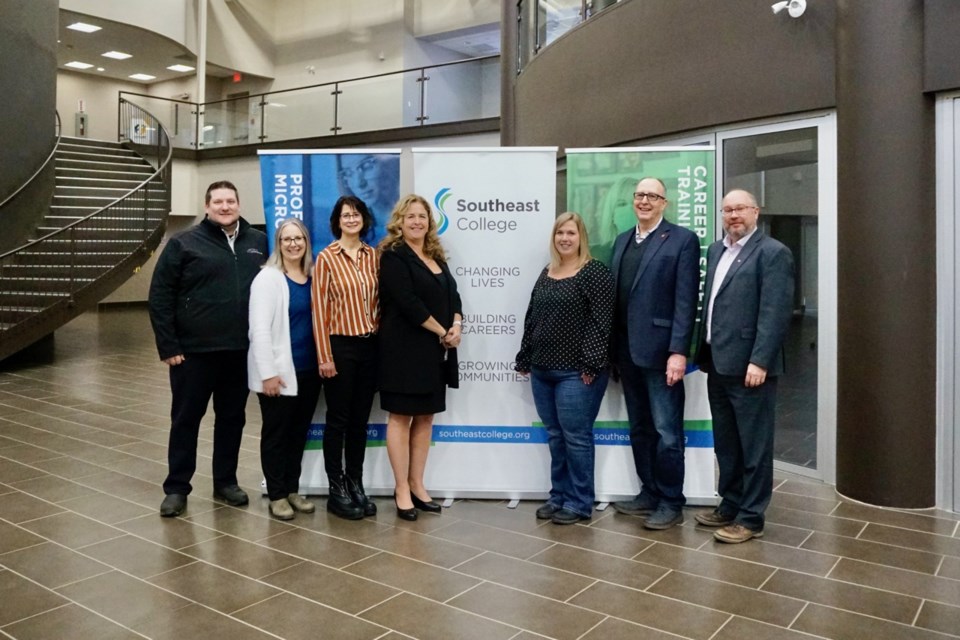Coal was one of the first commodities to be mined in Saskatchewan, but a college in the heart of the province’s coalfields is preparing the province for a low-carbon future.
Southeast College in Estevan has received a grant of up to $200,000 through the Municipal Coal Transition Funding Committee towards first-year start-up costs for its Centre of Sustainable Innovation in Estevan. The official presentation took place Jan. 23 at the college's Estevan campus.
The centre, now in operation, reflects the importance of sustainable innovation in the growth of industries across the province. The centre will be home to applied research, just-in-time learning and entrepreneurship in support of sustainability and innovation.
"The establishment of this centre will assist in attracting investment and advancing the development and diversification of the southeast region's economy," stated Dr. Vicky Roy, CEO and president of Southeast College.
Roy said the centre will work on finding sustainable energy solutions and opportunities applicable to the region and its people.
"Applied research can be about value-added agriculture, agriculture, sustainable energy, carbon capture, tourism and hospitality management,” she said.
"The difference between applied research in college or polytechnic and research in universities is we are just very action-oriented, working with the industry on problems and to solve issues or challenges … to make it happen. So that's exactly what we will do. But really, it's working with the cities, working with the partners here in the region, and the University of Regina on sustainable energy."
In October 2022, Southeast College and the University of Regina announced a memorandum of understanding with the intent to join forces to provide academic programming, career training, continuing education, applied research and international student support services to help meet education, economic and labour market needs. The partnership is an important step forward in expanding alternative and sustainable energy education in rural communities in southeast Saskatchewan.
The centre will also help with reskilling the people that will be affected by the transition out of coal-powered energy, Roy added.
Saskatchewan is Canada's third-largest producer of thermal coal, or lignite, and has resources in excess of five billion tonnes.
Estevan is home to the province’s largest coal mine, a 20,331-hectare operation owned by Westmoreland Mining LLC with an annual production of 4.3 million tonnes. Its clients include Saskatchewan Power Corp., an activated carbon processing joint venture supplying applications from agriculture to health care and environmental remediation, and a char plant Westmoreland owns which produces char for barbecue briquettes.
Despite being a major purchaser of Westmoreland’s coal, SaskPower has pledged to reduce carbon dioxide emissions by 50 percent from 2005 levels by 2030. Unit No. 3 at its Boundary Dam near Estevan operates a breakthrough Carbon Capture, Utilization and Storage (CCUS) facility with a demonstrated ability to reduce carbon dioxide emissions by more than 90 percent.
The new grant to Southeast College will help the new centre to get off the ground, but Roy said they will be looking for more funding and grants shortly. They are also currently hiring a vice-president of innovation and strategic development to oversee the centre.
Roy also said the college hopes to make more announcements come spring as it plans to potentially expand the college and provide even more opportunities for local, out-of-province and international students.
While there’s currently enough space at the Estevan campus for the new centre, that may change if the college moves forward the way they envision.
"It's going fast, fast and furious, and I think, it's great. The region is very, very entrepreneurial,” Roy said. “The city is entrepreneurial, the mayor, and it's a great place [to start the centre]. And it's a very, very nice community, a nice college, so I'm really happy that my visions fit the ones of the community."
She thanked Tania Hlohovsky Andrist and Darcy Nolte of the college’s strategic development division for being instrumental in obtaining the grant and moving the new centre forward.
Developed by the province as part of its plan to support communities while they transition from coal-based industries to other economic possibilities, the Municipal Coal Transition Assistance Program is administered by the Municipal Coal Transition Funding Committee that includes Ken Bonokoski, mayor, Town of Bienfait; Richard Tessier, reeve of the RM of Coalfields; James Trobert, councillor with the RM of Estevan; Ashley Galloway with the City of Estevan Economic Development Committee; Tony Sernick, councillor with the City of Estevan; and Roy Ludwig, mayor of the City of Estevan.
"On behalf of the Municipal Coal Transition Funding Committee, we are proud to have been able to support this application and we are confident that the money allocated will be used to the greatest benefit," said Mayor Roy Ludwig. "We are excited to be a part of this initiative with Southeast College and, having had the privilege to work with this extraordinary group, knowing this funding will assist the areas in reaching their greatest potential."



